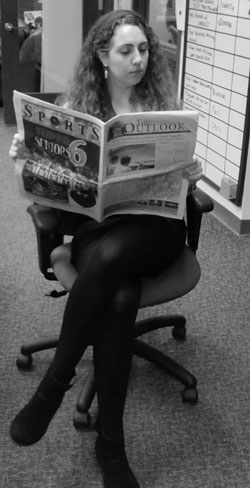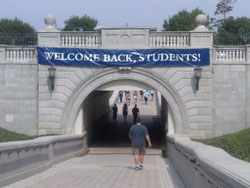In the current generation of college students, news has changed in terms of outlets, frequency, accessibility and even definition. While some students are avid news seekers, others are less concerned with events outside of their immediate surroundings. Some of this is due to a lack of time or no desire to seek out stories that they do not feel pertain to them directly.
Dr. Eleanor Novek, journalism professor explains that a student’s news intake depends greatly on what they consider to be newsworthy. “If you count sports as news, lots of people go after sports information. If you count celebrity gossip as news (and some people do), some people are very well informed about that,” said Novek. She does not believe that college age students are widely interested in hard news.
In a survey of 37 students at the University, seven listed stories about sports or celebrities when asked to provide three issues they had heard in the news in the last three weeks. Some of these included the results of the latest Devils vs. Flyers game, Kim Kardashian’s pregnancy and Justin Bieber’s rant on Instagram, a social media website that allows users to post images taken from their mobile devices.
Social media websites such as Facebook and Twitter do have a major impact on students’ news consumption. Fifty-nine percent of students surveyed said they use social media sites as one of their news sources and 19 percent say that these sites are their only source of news. Novek added that most of her students tell her they get their news from social media or websites that do not necessarily deliver hard news. “That’s why everybody knows about the cute little cat, but not necessarily who is the Secretary of State,” said Novek.
In fact, 30 percent of students could not list any issue in the news, except that there was a new pope elected to the Vatican. According to Dr. Chad Dell, Chair of the Department of Communication, becoming news savvy is a learned talent. “Some students are very news savvy: they see the value of well-researched news, and seek it out on a daily basis. They also learn to question their news sources, particularly when the source doesn’t provide a diversity of viewpoints,” said Dell.
Adversely, Dell added that many people of all generations are not news savvy and reach out only to the easily accessible entertainment sources that pose as news sites. “They [non-news savvy people] only seek out highly opinionated sources that simply reinforce what they already believe to be true.”
Novek believes that younger generations are not well trained at seeking out credible news sources. She said that students are quick to accept anything they find on the Internet as true. “That disturbs me, whether we’re talking about news or anything, because it’s so easy to post and disseminate outright lies, mistakes, all kinds of misinformation and if people don’t know how to search credible sources they get exposed to a lot of crap,” Novek said.
“Anyone is able to learn the difference between credible and untrustworthy sources– it just takes desire and practice,” said Dell. “I’ve seen very discerning students who wouldn’t be fooled for a second, and I’ve seen folks much older who don’t care to know the difference.”
Dan Gunderman, Editor-In-Chief of The Verge, feels that students do feel the need to stay current with the latest happenings, even if they don’t like to admit or not. “Though you may come across a student who says that news is ‘just not their domain,’ it’s a still quite hard to believe because the power of the news and media (being the fourth estate) allows average people to keep authoritative ones on their toes, and this is something that lures people of all ages,” Gunderman said. “News is knowledge plain and simple.”
Whether it is world news or local news, happenings in students’ surroundings have a major impact on their lives. Novek explained that issues in the economies of other countries matter to our own economy; for students it can affect their chances at getting summer jobs, internships or finding full time jobs after graduation.
She added that politics affects college students as well. For example, state laws on reproductive choice can impact young women on and off campus directly. “We don’t often pay attention to that kind of stuff when we’re in college, but the more we are in the working world the more we see it,” she said. “So it doesn’t surprise me when college students aren’t especially interested in national news and international news because they’re not really seeing the connection yet.”
However, a lack of interest in news, is not necessarily an epidemic. Of the students surveyed, 30 percent said they actively seek out news at least five times a week. All of these students were able to come up with multiple topics in recent news, all diverse. Some topics included the New York soda ban, updates in the Trayvon Martin case, protests in Yemen and the Queen of England standing up for gay rights.
What is becoming obsolete in the college student generation is print news. Novek said that very few students read newspapers since the technological advances in recent years has made it more convenient for students to search the web. Only three out of 37 students said they read print news such as The Wall Street Journal or The Asbury Park Press.
The most relevant news to college students according to Novek is economic and social justice news. She mentions a writer who appeared at the University before spring break, Jonathan Kozol who spoke to students about how a great education can help students in poverty break out of that lifestyle and make progress. “There were a lot of students in the group who were listening to that and who were really excited to get that information…I think college students are motivated by wanting to change the world for the better,” said Novek.
Local news also has a great impact on younger generations, yet few students look for it. Of the 37 students surveyed, only one listed a local news story that pertained directly to campus: the selection of the new president at the University.
Novek encourages people who have never read their local newspapers to pick it up. She adds that local papers are full of opportunities for students that they may not otherwise come across. For example, there may be local concert listings, job or internship opportunities, or relevant ads for places or items that students might need.
PHOTO TAKEN by Casey Wolfe



